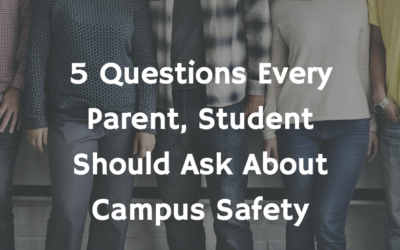
College families and their students are wise to consider some practical questions about campus safety.
The Clery Act requires all colleges and universities that participate in federal financial aid programs to keep and disclose information about crime on and near their respective campuses. In fact, the Jeanne Clery Act is a result of an effort by her parents to require colleges and universities to annually publish consumer protection law that aims to provide transparency around campus crime policy and statistics.The law is named after Jeanne Clery, a 19-year-old Lehigh University student whom Joseph Henry raped and murdered in her campus hall of residence in 1986. Henry’s murder of Ms. Clery triggered a backlash against unreported crime on campuses across the country.
Parents and prospective students can look at an institution’s annual security report, which should be available on the school’s website, to find statistics on crime, disciplinary actions,  and campus safety policies.
and campus safety policies.
However, according to US News “college families can – and should – dig deeper. Campus safety policies vary, so parents and prospective students will have to research schools and decide if they’re comfortable with an institution’s practices.”
We have tried to reduce the effort required for college parents by summarizing the 5 essential questions to learn more about campus safety. In fact, it is important to not just ask about crime statistics but to consider the context for how a college and university promotes a culture of well-being and safety for your student.
1. How does the school communicate with students in an emergency? Schools may use different methods, such as emails, texts, display signs on campus or sirens to alert students during an emergency. Today, nearly all Colleges and universities have a plan that allows them to alert students even when they’re out of cell phone or Internet range. Learn whether students need to opt in or out of notification programs and if parents are allowed to sign up for updates.
2. Does the university rely on its own security team, with city or county police stations off campus? Prospective students should know if campus safety is monitored by private security or police and how the security team coordinates with off-campus police when a crime occurs. Campus security, whether police or private, should be trained to respond to disorder, support the fire department, provide first aid and render initial support, says Gary Margolis, managing partner at Margolis Healy and Associates, a security consulting firm that works with schools. Students should also know if misconduct is handled through the legal system or on campus.
3. Who investigates an allegation of sexual assault or sexual harassment at the university? “The goal is to know that the college would handle the investigation – period – and it’s important for them to know who the Title IX coordinator is and to whom a student could complain if a student had a concern,” says Catherine Lhamon , assistant secretary for civil rights at the U.S. Department of Education. Students should understand how schools handle reports made online or through campus abuse hotlines. Families should also know what procedures schools have in place to provide confidentiality for the accuser and ensure the victim and the rest of the student body are safe, legal experts say. “The key thing is to have clarity,” Lhamon says. “Families should be looking for clear policies from the university and for clear statements on who to go to for help and how to find that person.”
4. How does the School Disclose of Campus Security and Campus Crime Statistics? College and Universities that receive federal financial aid are required to publish this data annually. Some schools are accused of underreporting crimes such as sexual assaults. In fact, a review of national data from 2015, among the main or primary campuses of colleges and universities with an enrollment of at least 250 students, 73 percent disclosed zero rape reports in 2015. In addition and somewhat astonishing, hundreds of schools report no crime or theft. Your questions during the admissions and orientation process can help identify if the school is honest about such factors and give you another factor to consider when evaluating if the school is a good fit for your student.
5. What prevention programs do you have to educate students about safety? Ideally, schools should offer bystander intervention – programs that teach students how to step in when they see another student in trouble – to students throughout their college career, the Victim Rights Law Center’s Bruno says. A comprehensive program includes tips for risk reduction and prevention strategies and suggestions for how bystanders can intervene and remain safe. “If it’s not made a priority by the school, then it’s not going to be a priority to the students,” she says.
Thanks to the good work by US News for highlighting these and other questions that are vital for college students and their families to consider.



